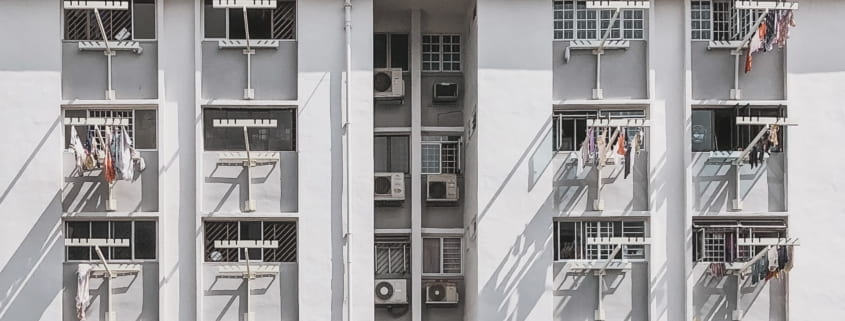Accessing Housing in a Meritocratic Society: A Single Mother’s Reality
By Afiya Dikshit (’23) and Lim Tian Jiao (’23)
This op-ed is an extension of the policy memo WeCARE: Expanding childcare awareness to facilitate employment for single mothers.
Access to safe, stable housing is widely regarded as a fundamental right. Yet, in a country with one of the highest home ownership rates in the world, single parents in Singapore still struggle to attain affordable housing for themselves and their children.
The Problem
Singapore’s stringent housing policies are a bane for a particularly marginalized population: divorced mothers facing limited employment opportunities.
Mothers often take on the brunt of caregiving burdens in a household. During their marriages, many mothers leave the workforce—in 2018, 81% of women [1] outside of the labor force cited family responsibilities as the main reason for not seeking employment—or face reduced career progression.
The disadvantages of leaving or slowing down careers are apparent after a divorce, especially for homemakers who suddenly find themselves the sole breadwinners. Women who attempt to reenter the workforce after a long hiatus are met with few employment opportunities. For those with limited family support, childcare may constrain them [2] to poorly-paid part-time jobs, preventing them from increasing their income.
After divorce, many single mothers also sell the flats they had previously resided in or jointly owned with their ex-spouses, leaving them and their children in need of alternative housing. Given their financial constraints, it may seem clear that government provisions have to be put in place to support single mothers’ search for stable housing.
However, government housing laws are unable to bridge this gap.
The Housing Development Board (HDB) debars individuals from renting a HDB apartment within 30 months [3] of selling their previous apartment. Although this debarment period is waived for parents who have full custody of their child [4], it prevents mothers without full custody from immediately finding a safe, affordable living space if they lack the means to purchase a flat.
Furthermore, a $1,500 monthly income cap on HDB subsidized rental housing cuts off many lower-income mothers. The Association of Women for Action and Research (AWARE) study found that 47.4% of respondents [3] who applied for rental housing faced difficulties because they earned more than the income cap.
Without access to stable and affordable public housing, single mothers are often forced [5] to rent on the open market at higher prices, or move in with relatives—an option that many are hesitant to turn to, for fear of conflict with or imposition on their family.
Policies Penalise Mother and Children Alike
Lack of social support for non-nuclear families can penalize single mothers for liberating themselves from toxic or abusive marriages. This disincentivizes mothers from leaving dangerous family situations, leading to worse conditions for mothers and children alike.
The time and energy mothers spend battling for housing can be better spent securing employment opportunities. Reducing barriers to housing would allow them to better participate within Singapore’s social system, helping them support their families.
Singapore’s meritocratic system should offer everyone fair educational opportunities regardless of their social background. Lee Hsien Loong, Prime Minister of Singapore, said in 2018 that meritocracy can be indicated by every child having a “good start in life, regardless of which family they are born in.” [6]
But for children growing up in single-parent families, unstable housing and constant uncertainty are realities that hinder development. Government policy uplifts lower-income children through academic and financial assistance [7], but ignores the fact that family circumstances are inextricable from student performance. Can we expect disadvantaged children to thrive if they are left to study in cramped one-room spaces, along with rowdy younger siblings? Or what if they suffer a lack of privacy and loss of dignity on a daily basis by living with relatives who make it clear that they are not wanted in the shared space [5]?
In our meritocratic society, surely more can be done to level the playing field.
What’s Next?
Louis Ng, a Member of the Parliament of Singapore (MP), recently appealed to the Ministry of National Development (MND) to implement objective criteria on how discretionary housing applications—the category single mothers use to apply for rental post-divorce—are evaluated. This appeal was rejected on the grounds that the Government needs to exercise maximum flexibility [8] in deciding whether or not to grant appeals for each case.
However, problems in “case-by-case” judgement remain. According to AWARE’s study, of the 69% of single mothers who sought help from an MP to access public housing, 55% were unable to access it [3]. HDB officers do not always explain [3] why single mothers’ housing applications have failed, or what alternatives are available moving forward.
Surely more can be done in this regard. Instead of a fixed criteria for housing applications, MND could commit to a concise written explanation of the reasons behind failed housing appeals, and the immediate steps an applicant could take to make their next application more successful. This would give single mothers concrete actionables towards their housing goals.
Next, the government could allocate a larger proportion of flats for rental housing. High occupancy rates of public rental housing—97.4% in 2013 [8]—suggest that demand is high. Increasing supply also ensures that families who need housing can access it.
In Singapore, policies ensuring both near-universal homeownership and an equal playing field for all have been praised locally and abroad.
We only ask that single mothers and children are fairly included in both.
Endnotes
- Hingorani, Shailey. “Why Are Mothers Penalised at Work?” May 15, 2019. https://www.todayonline.com/commentary/why-do-mothers-get-penalised-work.
- Glendinning, Emma, Catherine Smith, and Md Kadir. “Single-Parent Families in Singapore: Understanding the Challenges of Finances, Housing and Time Poverty.” Lien Centre for Social Innovation: Research, 2015.
- AWARE. Single Parents’ Access to Public Housing: Findings from AWARE’s Research Project. 2016.
- Chan, Joanne. “Flat Debarment Period Waived for Divorcees with Children.” CNA, 24 Mar. 2017, www.channelnewsasia.com/news/singapore/flat-debarment-period-waived-for-divorcees-with-children-8441988.
- Kok, Xing Hui. “Accommodate Single Parents in Housing Policies, Urges Aware.” The Straits Times, February 16, 2017. https://www.straitstimes.com/singapore/housing/accommodate-single-parents-in-housing-policies-urges-aware.
- Kwang, Kevin. “Singapore Society Must Maintain ‘Informal and Egalitarian Tone’: PM Lee on Tackling Inequality.” Channel NewsAsia, 16 May 2018, www.channelnewsasia.com/news/singapore-society-must-maintain-informal-and-egalitarian-tone-pm-10239110. Accessed 7 Dec. 2020.
- Ministry of Social and Family Development. Improving the Lives of Low-Income and Vulnerable Families in Singapore. November, 2018, https://www.msf.gov.sg/publications/Pages/Improving-the-Lives-of-Low-Income-and-Vulnerable-Families-in-Singapore.aspx.
- Ministry of National Development. “Reply by SPS Sun Xueling in Response to Adjournment Motion on ‘Providing Housing for Single Unwed Parents.’” Ministry of National Development Speeches, Ministry of National Development, 2 Sept. 2019, www.mnd.gov.sg/newsroom/parliament-matters/speeches/view/reply-by-sps-sun-xueling-in-response-to-adjournment-motion-by-mp-louis-ng-kok-kwang-(nee-soon-grc)-on-providing-housing-for-single-unwed-parents.
Image Credit: Dollars and Sense




Leave a Reply
Want to join the discussion?Feel free to contribute!